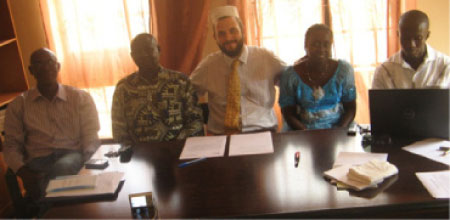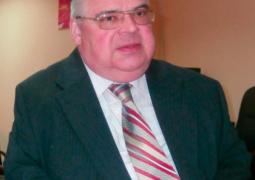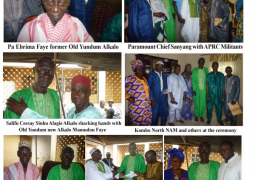
The Gambia Federation of the Disabled (GFD) yesterday convened a press briefing ahead of the celebration of the Disability Open Week and National Epilepsy Week set to kick off on Wednesday 22 May and end on 26 May 2013.
Speaking at the briefing, Anton Venus, Executive Director of the Gambia Federation of the Disabled, said the week is set aside by the GFD to celebrate the achievements made by the disability community in The Gambia.
He said it would also be used to exhibit their talents and break the stigma and discrimination against them by society.
He disclosed that National Epilepsy Week is also internationally agreed to be observed on these same dates.
He stated that both events coincided and are the first of their kinds in the history of the disability community in The Gambia and the country as a whole.
As part of the celebration, the GFD would conduct series of activities such as press briefing, radio and TV programs, meeting with Mayors/Governors and sensitization programmes in schools.
Edrisa Korita, project coordinator, Disability Employment Services, speaking on the employment opportunities for people with disabilities, said disabled people have been sidelined when it comes to employment.
According to him, people with disabilities should equally be given the job opportunities as some of them are highly trained even more than the so-called able persons.
Mr Korita noted that employing people with disability is a corporate social responsibility, adding that if you employ a disabled person you make a great impact in his or her life.
Lamin Dibba, chairperson for the Association for Mentally Disabled, who spoke on epilepsy and how to care for persons with epilepsy at work, said a serious neurological problem that commonly affects people is epilepsy.
He remarked that it can strike any person regardless of age, gender, race or social class, adding that it tends to appear more commonly is children and people over the age of 65 years.
He also noted that there are different types of epilepsy seizures that can affect different individuals.
Madam Isatou Sanyang, chairperson of the GFD, who spoke on politics and social inclusion for persons with disabilities, said they are working with the Government of The Gambia for the signing and ratification of the Convention and bailout on the right of disabled people though it’s yet to be ratified.
She said they feel they have been discriminated against and stigmatized as they are born citizens of the country and are contributing to the development of the nation.
Madam Sanyang stated that they have also worked with the Department of Social Welfare and the National Assembly and have also made follow-ups for the ratification but that nothing much has been done so far.
She noted that being disabled does not mean being unable, adding that they still do not know why the policy has not been adopted.
Ms Sanyang said they are being sidelined by the community and called on the Government to ratify the policy, saying The Gambia is among 14 countries in Africa that have not signed the convention and bailout on the right of disabled people.
“We cannot force the Government to ratify the policy,” he remarked, saying that any human being could become disabled through accident or other ways.
She therefore calls on the Government to ratify the policy.
Amadou Touray, Honorary life President of the Gambia Association for the Deaf and Hard of Hearing, gave the vote of thanks.
Read Other Articles In Article (Archive)
MRC holds open day at Serrekunda Health Centre
Jun 13, 2017, 10:45 AM



